2013版初中英语全程复习方略课件(教材复习案)七年级下册 Units 1-4(人教版)(共56张PPT)
文档属性
| 名称 | 2013版初中英语全程复习方略课件(教材复习案)七年级下册 Units 1-4(人教版)(共56张PPT) | 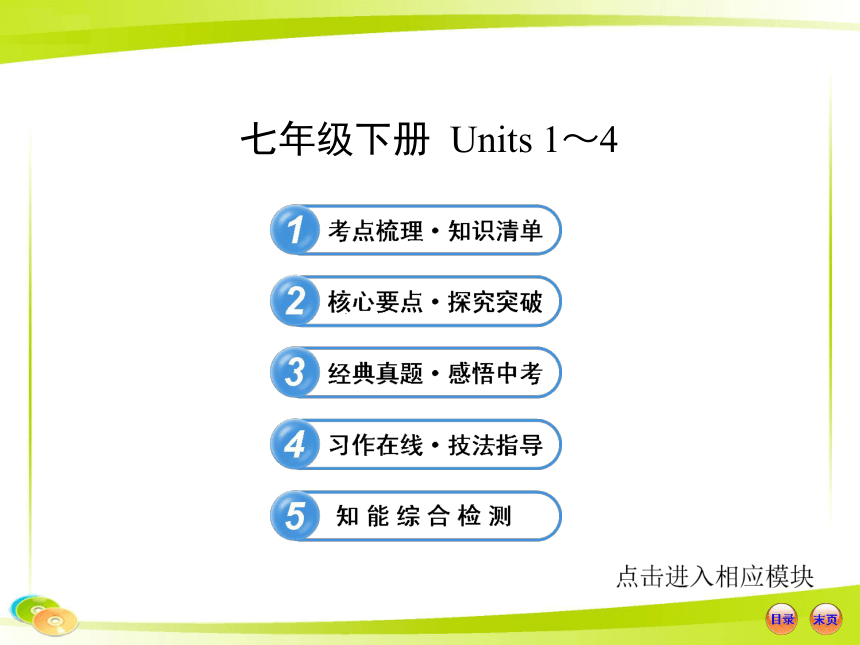 | |
| 格式 | zip | ||
| 文件大小 | 1.8MB | ||
| 资源类型 | 教案 | ||
| 版本资源 | 人教新目标(Go for it)版 | ||
| 科目 | 英语 | ||
| 更新时间 | 2014-03-06 21:37:53 | ||
图片预览

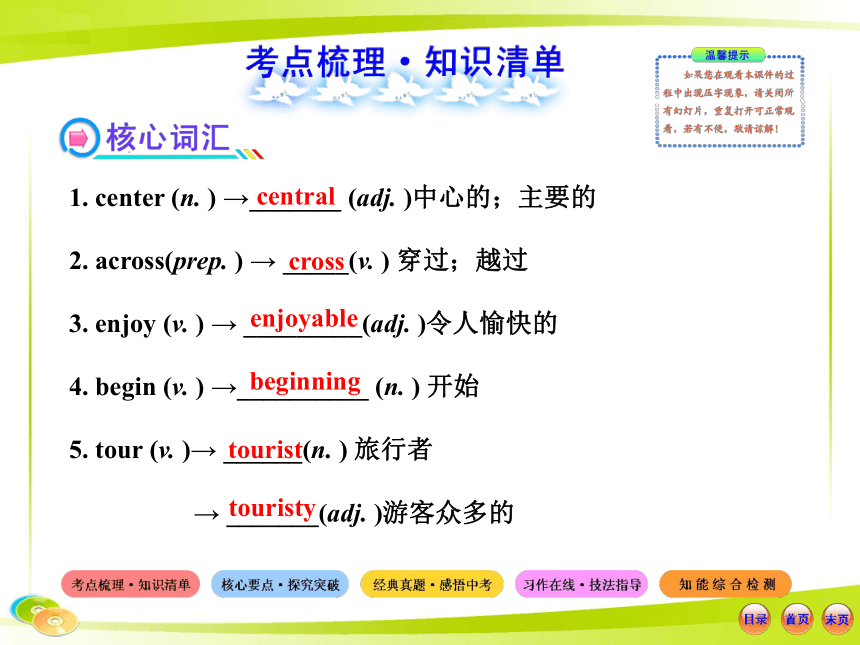
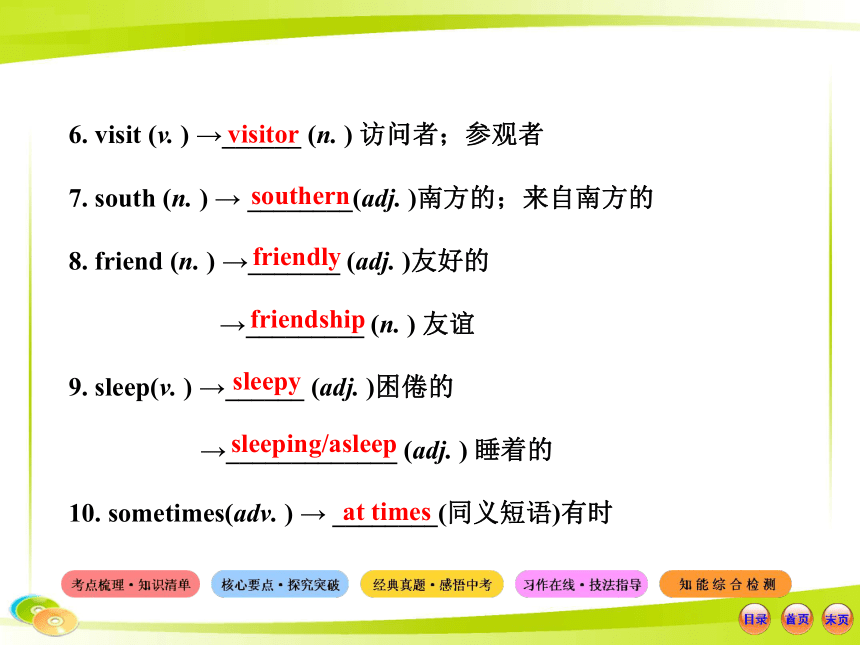
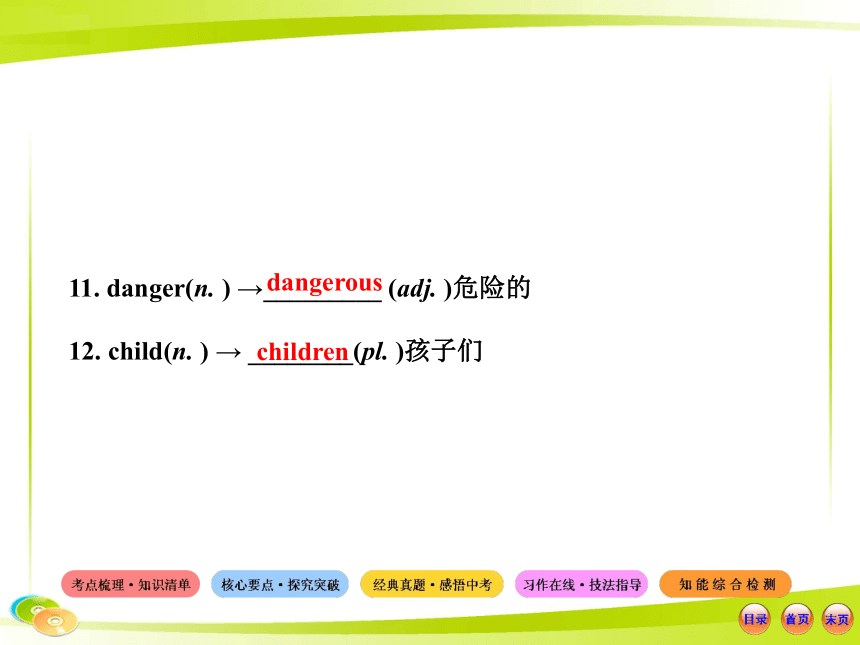
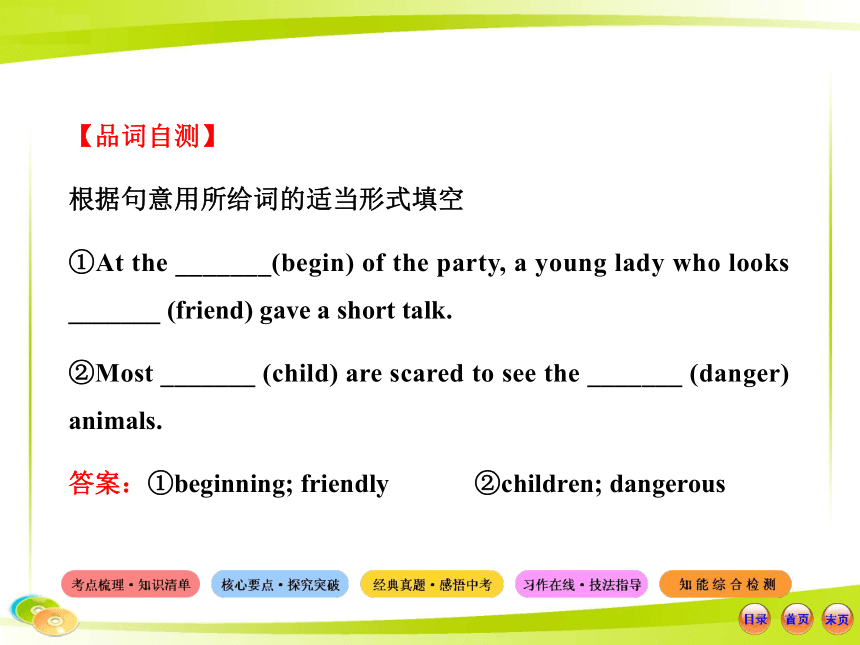
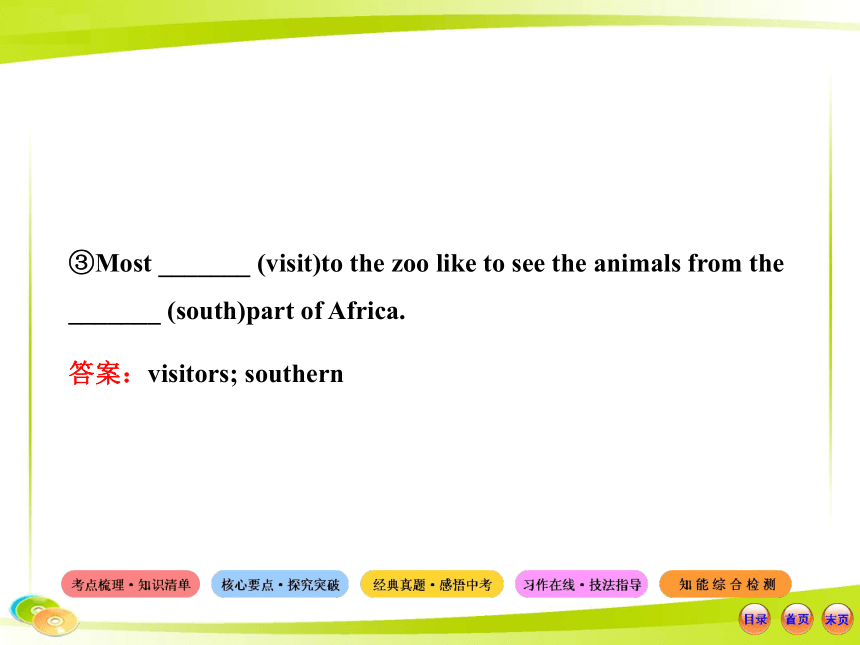
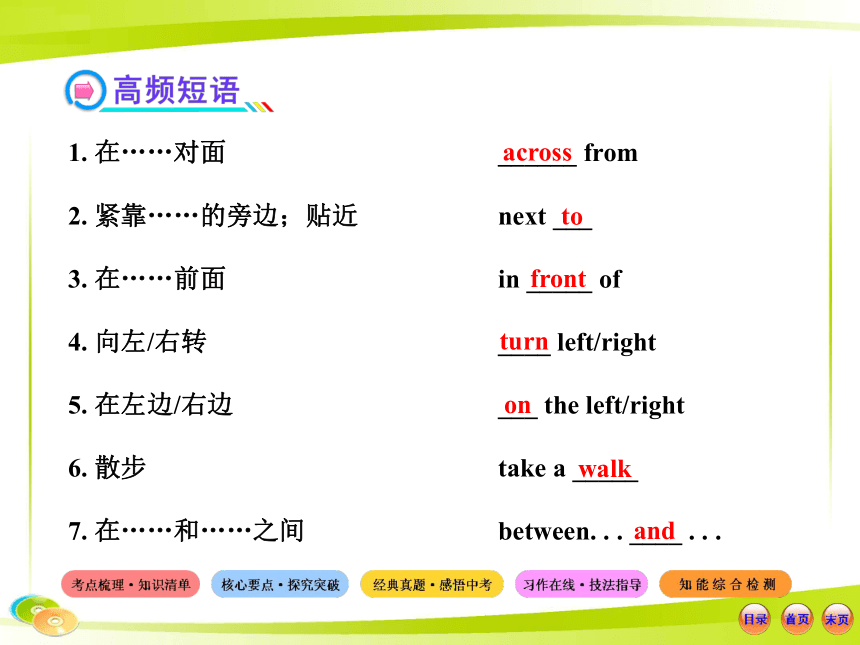
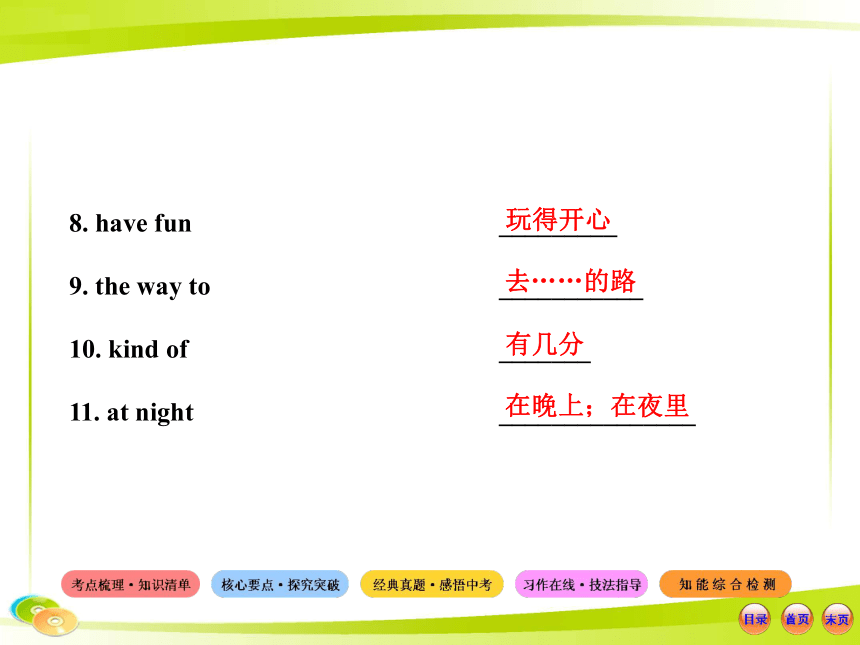
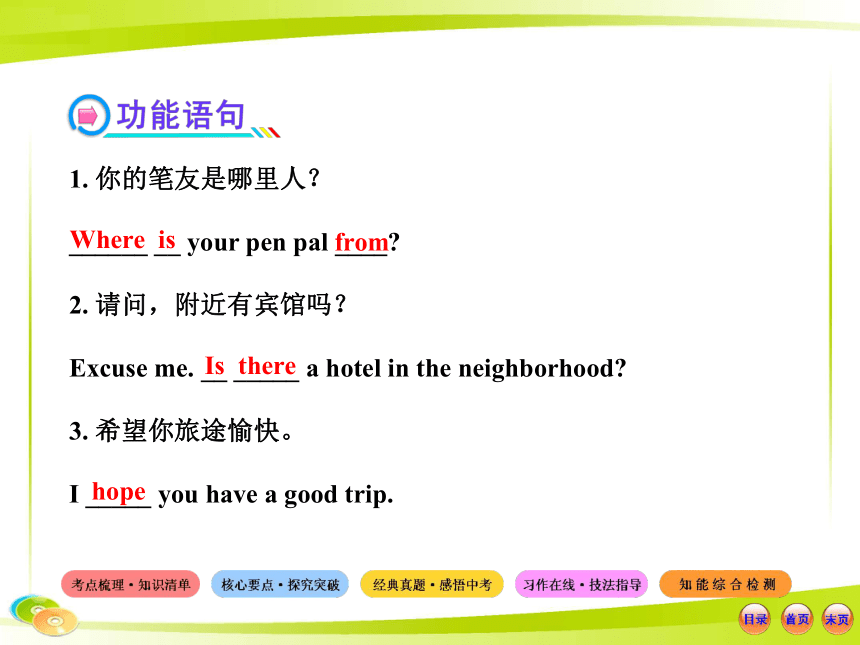
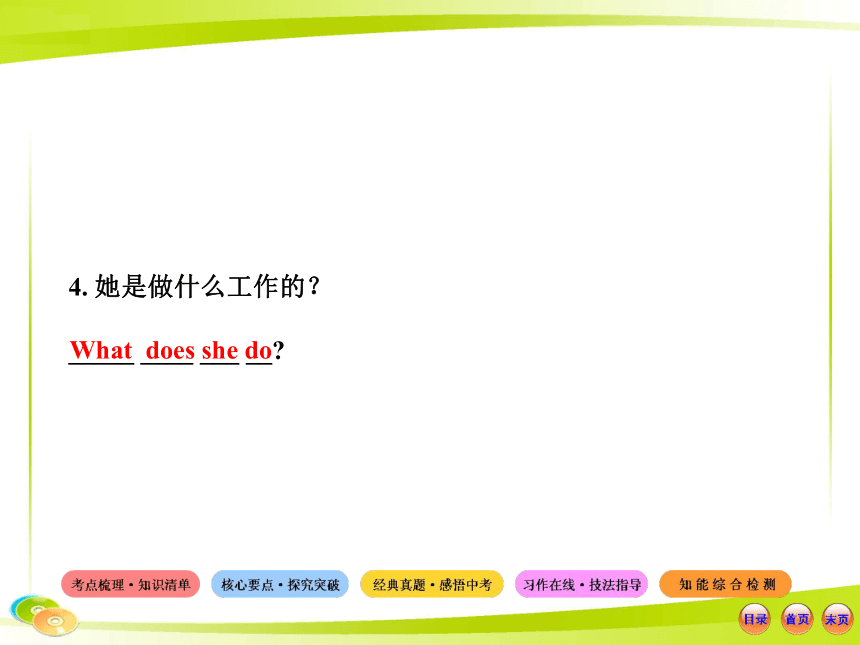
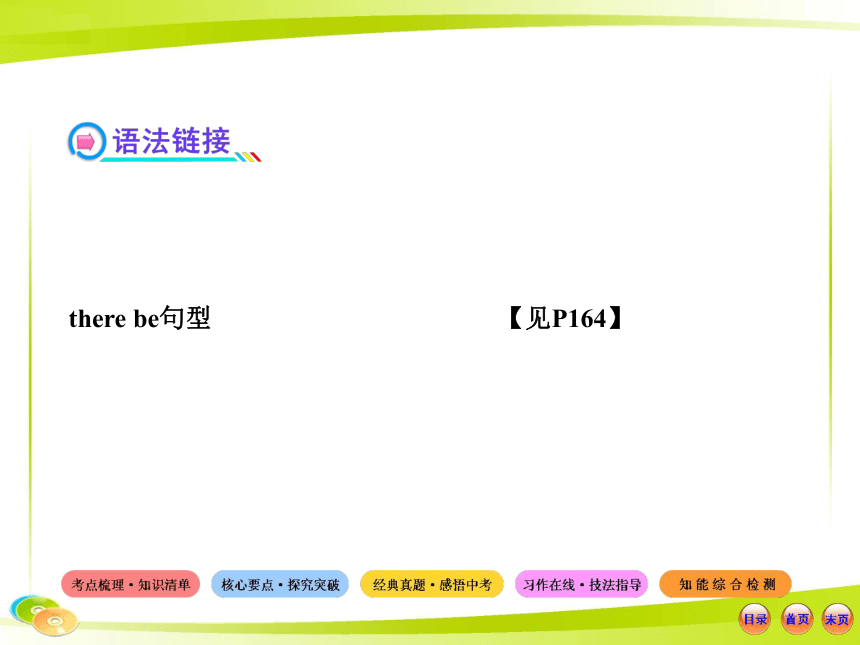
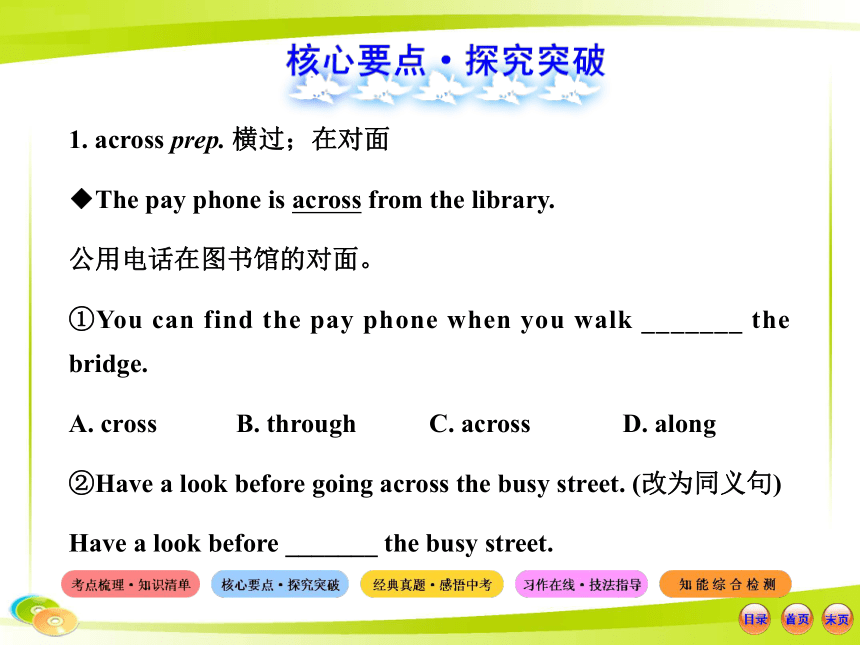
文档简介
(共56张PPT)
七年级下册 Units 1~4
1. center (n. ) →_______ (adj. )中心的;主要的
2. across(prep. ) → _____(v. ) 穿过;越过
3. enjoy (v. ) → _________(adj. )令人愉快的
4. begin (v. ) →__________ (n. ) 开始
5. tour (v. )→ ______(n. ) 旅行者
→ _______(adj. )游客众多的
central
cross
enjoyable
beginning
tourist
touristy
6. visit (v. ) →______ (n. ) 访问者;参观者
7. south (n. ) → ________(adj. )南方的;来自南方的
8. friend (n. ) →_______ (adj. )友好的
→_________ (n. ) 友谊
9. sleep(v. ) →______ (adj. )困倦的
→_____________ (adj. ) 睡着的
10. sometimes(adv. ) → ________(同义短语)有时
visitor
southern
friendly
friendship
sleepy
sleeping/asleep
at times
11. danger(n. ) →_________ (adj. )危险的
12. child(n. ) → ________(pl. )孩子们
dangerous
children
【品词自测】
根据句意用所给词的适当形式填空
①At the _______(begin) of the party, a young lady who looks _______ (friend) gave a short talk.
②Most _______ (child) are scared to see the _______ (danger) animals.
答案:①beginning; friendly ②children; dangerous
③Most _______ (visit)to the zoo like to see the animals from the _______ (south)part of Africa.
答案:visitors; southern
1. 在……对面 ______ from
2. 紧靠……的旁边;贴近 next ___
3. 在……前面 in _____ of
4. 向左/右转 ____ left/right
5. 在左边/右边 ___ the left/right
6. 散步 take a _____
7. 在……和……之间 between. . . ____ . . .
across
to
front
turn
on
walk
and
8. have fun _________
9. the way to ___________
10. kind of _______
11. at night _______________
玩得开心
去……的路
有几分
在晚上;在夜里
1. 你的笔友是哪里人?
______ __ your pen pal ____
2. 请问,附近有宾馆吗?
Excuse me. __ _____ a hotel in the neighborhood
3. 希望你旅途愉快。
I _____ you have a good trip.
Where is
from
Is there
hope
4. 她是做什么工作的?
_____ ____ ___ __
What does she do
there be句型 【见P164】
1. across prep. 横过;在对面
◆The pay phone is across from the library.
公用电话在图书馆的对面。
①You can find the pay phone when you walk _______ the bridge.
A. cross B. through C. across D. along
②Have a look before going across the busy street. (改为同义句)
Have a look before _______ the busy street.
【自主归纳】
“横越穿过”,指从表面走过或从
一边到另一边
“穿越”,指从空间内穿过
go ______ the street
(=cross the street)
go ________ the tunnel
across
through
答案:① C ②crossing
“越过”,指超过一段距离或度
过一段时间
2. enjoy v. 享受……的乐趣;欣赏
◆Turn left on First Avenue and enjoy the city’s quiet streets and small parks.
在第一大道左转,享受城中街道的宁静和小公园(的乐趣)吧。
①I enjoy _______(go) to the concert while my parents like listening to Beijing Opera.
②The children had a great time in the water park. (改为同义句)
The children _______ _______ very much in the water park.
【自主归纳】enjoy的用法
(1)enjoy sth. 表示“享受……的乐趣”
(2)enjoy ______(do/doing/to do) sth. 喜欢做某事
(3)enjoy oneself玩得开心,相当于_____ a good time或have ___
(4)enjoy的形容词是enjoyable,意为“令人愉快的”
答案:①going ②enjoyed themselves
doing
have
fun
3. wear v. 穿;戴
◆I wear a white uniform and I help doctors.
我穿着白色工作服并且帮助医生工作。
①If you want to go to the school party, you have to ________ school uniform.
A. wear B. put on C. dress D. in
②I waited for a long time before my mother got ________ (dress).
【自主归纳】
dress
给……穿衣
表示动作或状态, 宾语通常
是人:dress sb. “给某人穿
衣服”(动作);dress oneself
给自己穿衣服;be/get
dressed in. . . “穿
着……”(状态)
put on
穿上;戴上
强调动作,宾语通常是衣
服、鞋帽;宾语若是代词
必须放在put和on之间;反
义词组是take off
put on穿上(动
作);
dress sb. /oneself
给某人/自己穿
衣服
wear
穿着;戴着
强调状态,宾语可为服
装、鞋帽、饰物、奖章等
be in穿着
后接衣服、帽子等,此时
可以和wear或have sth. on
替换。其后也可以接颜
色,不能用于进行时态
wear穿着;戴着
(状态);
be in穿着
【判断抢答】判断下面句子翻译正误
今天我们的数学老师穿了一身新套装。
①Our math teacher is dressing a new suit today. ( )
②Our math teacher is wearing a new suit today. ( )
③Our math teacher is putting on a new suit today. ( )
④Our math teacher is in a new suit today. ( )
答案:①A ②dressed
×
√
×
√
4. sometimes adv. 不时;有时
◆Sometimes I work in the day and sometimes at night.
我有时白天上班,有时晚上上班。
①(2011·黔西南州中考)—What do you often do after supper
—I often watch TV, but sometimes go out for a walk.
A. some times B. sometime
C. at times D. some time
②(2011·兰州中考)He said he would come to see us _______ the next afternoon.
A. sometime B. some time
C. sometimes D. some times
【自主归纳】
________ 某时,常指将来时间
some time 一段时间(time不可数名词)
_________ ①(=at times)有时候;②句首或句末
some times 几次;几倍(time可数名词)
sometime
sometimes
【一言巧辨异】Sometimes I think about going to Sanya on vacation for some time sometime next summer, although I’ve been there some times before.
有时我考虑明年夏天找时间去三亚度假一段时间,尽管以前已经去过那儿几次了。
答案:①C ②A
5. in front of在……前面
◆The pay phone is in front of the library.
公用电话在图书馆前面。
①The boy _______ me is so tall that I can’t see the blackboard at all.
A. behind B. in front of
C. beside D. in the front of
②My seat is in the back row but his is _______ _______(在前面).
【自主归纳】
_________表示位置
“在……(外部)的前面”
in front of
at/in the front of
in front“在(最)前面”,
后无宾语
_______________表示
位置“在……(内部)的
前面”
答案:①B ②in front
6. kind of有几分
◆Because they’re kind of interesting.
因为它们有点有趣。
①It’s kind of cold today.
A. a little B. a bit of
C. a bit little D. a little of
②They have different _______ mobile phones on sale in that shop called “New World”.
A. kind B. kinds
C. kind of D. kinds of
【自主归纳】kind及kind of的用法
(1)kind adj. 亲切的;和蔼的;be kind to sb. 对某人和善
n. 种类 (all/different) kinds of各种各样的
(2)kind of可以表示“有点;有几分”,后接形容词或副词,同义
短语a little、a bit或_________
答案:①A ②D
a little bit
7. —Excuse me. Is there a hotel in the neighborhood
——请问,附近有宾馆吗?
—Yes, there is. Just go straight and turn left.
——是的,有。向前直走,然后左转弯。
①—Could you tell me _______
—Just go straight. It’s on your right.
A. where the police station is
B. what your name is
C. which country you come from
D. why you like koalas
②—What’s in the bag
—There _______ a book and some other school things.
A. have B. has C. is D. are
【自主归纳】
(1)there be句型的用法
①there be句型表示“某地有某物”,强调客观存在;而have表
示“拥有”,强调所属关系
②there be句型的“就近原则”:后接多个名词或代词时,be动
词由第一个名词或代词决定
③there be句型的将来时形式为there ______或there is/are going
to be
will be
④There be sb. doing sth. 相当于sb. be doing sth. 表示某人正在做某事
(2)常用的问路句型:
Is there a/an. . . (near here/in the neighborhood)
Where’s the nearest. . .
How can I get to. . .
Could you tell me the way to. . .
Can you tell me how to get to. . .
Excuse
me.
(3)常用的指路句型:
①It’s +介词短语(地点),它在……。
②It’s about . . . meters from here. 离这儿大约……米。
③It’s about . . . meters along on the left/right.
向前走,在左/右侧大约……米。
④Walk on and turn left/right. 向前走,然后左/右拐。
⑤Turn left/right at the first crossing. =Take the first crossing on the left/right. 第一个路口左/右拐。
(4)指路者有时会在指路完毕后追加一句“You can’t miss it. (你一定会找到的)”给对方鼓劲;
若问路时对方不知道,问路者常用“Thank you all the same. (仍然要谢谢你)”表示谢意。
答案:①A ②C
8. What does she do 她是做什么工作的?
①—_______ do you do
—I’m a computer programmer.
A. What B. How C. Where D. Why
②What does the boy do, do you know (改为同义句)
_______ _______ the boy, do you know
【自主归纳】询问职业的常用句型
(1)What +do/does+主语+do
(2)What +be+主语
(3)What +be +one’s +job
答案:①A ②What is
Ⅰ. 单项选择
1. (2012·福州中考)—We’ll go for a picnic if it _______ this Sunday.
—Wish you a lovely weekend.
A. rain B. doesn’t rain
C. won’t rain
【解析】选B。考查if引导的条件状语从句。主句是一般将来时,if引导的条件状语从句应该用一般现在时。句意为“如果这个星期天不下雨的话,我们就去野餐。”故选B。
2. (2012·安徽中考)—Tom isn’t feeling very well.
—He seems to have a cold _______ the weather changes suddenly.
A. before B. so C. because D. though
【解析】选C。考查连词的用法。句意为:“——汤姆感觉不舒服。——他好像病了,因为天气突变。”before在……以前;so因此;because因为;though尽管。C项符合句意。
3. (2012·无锡中考)Don’t drive so fast! We must slow down when we drive _______ the tunnel.
A. past B. across
C. over D. through
【解析】选D。考查介词的用法。句意为:“不要开车太快!驾车穿越隧道时我们必须减速。”表示“从空间内穿过”用介词through。
4. (2011·陕西中考)John wants to be a _______, so he often helps sick people in the hospital.
A. reporter B. doctor
C. scientist D. cook
【解析】选B。考查名词的辨析。reporter“记者”; doctor“医生”;scientist“科学家”;cook“厨师”。由后一句“因此他经常在医院里帮助病人”得知前面是医生,故选B。
5. (2011·深圳中考)—Could you please tell me something about the two _______
—_______. They are exchange students of No. 1 Middle School.
A. Frenchmen; Yes, please
B. Frenchmans; Come on
C. Germen; Not at all
D. Germans; All right
【解析】选D。考查名词的复数和语境。German—Germans; Frenchman—Frenchmen。
6. (2011·上海中考)There _______ still some milk in the fridge. It’s not necessary to go to the store today.
A. am B. is
C. are D. be
【解析】选B。考查there be 结构中的主谓一致。be 用单数还是用复数,取决于be后的名词。milk为不可数名词,be应该用单数。故选B。
Ⅱ. 根据句意及首字母或汉语提示完成单词
1. (2012·湖州中考)I don’t like the soap opera. It’s very b_______.
2. (2012·桂林中考)Don’t be _______(害羞)when you speak English to foreign friends.
3. (2011·连云港中考)—Would you please _______(邮寄) the letter for me —With pleasure.
答案:1. boring 2. shy 3. post
4. (2011·漳州中考)It’s cool and the _______(叶子)fall from the trees in autumn.
5. (2011·苏州中考)Do you know the difference _______(在……之间)“beside”and “besides”
答案:4. leaves 5. between
Ⅲ. 用所给词的适当形式填空
1. (2012·兰州中考)Look! There are many old people _______(do)morning exercises at the square.
2. (2012·淮安中考)Peter and Simon enjoyed _______(they)at the English party last night.
3. (2012·安顺中考)The boys like playing basketball because they think they can be _______(relax).
答案:1. doing 2. themselves 3. relaxed
对某地的介绍类题目在中考中常见于半命题写作。在写此类话题作文过程中要注意:1. 紧扣话题,重点介绍;2. 表述条理,覆盖要点。
【典题示例】
(2012·重庆中考)
假如你校有几位来自美国的交换生,他们打算周末步行去翠湖公园。请根据提示为他们写出前往的路线,并简介公园情况。
要点提示:
1. 路线(见右图)
2. 公园环境优美、凉爽
3. ……
要求:
1. 词数:80左右,开头已给出,不计入总词数。
2. 文中不能出现自己的姓名和所在学校的名称。
Cuihu Park is not far from here. It’s easy to get there. Just
go straight _____________________________________________
______________________________________________________
______________________________________________________
______________________________________________________
______________________________________________________
【审题谋篇】
1. 文章说明路线,介绍景色,应属说明文,主要考查学生对细节内容和整体规划的发挥能力;
2. 人称:第一人称和第二人称;
3. 主要时态:一般现在时
4. 高分模板:
【佳作诵读】
Cuihu Park is not far from here. It’s easy to get there. Just go straight and turn right at the first corner. Walk along the road and turn left when you find a hospital. Cuihu Park is down the street on your right. Across from the park is a restaurant.
The park is really a good place to have fun. It’s beautiful and cool with many trees and flowers. You can swim, play games or have a picnic there. It’s very relaxing. You may also get a good chance to practice Chinese. I hope you will enjoy yourselves.
【名师点睛】
1. 文中运用turn right, walk along, on your right, across from等不同短语说明位置,结合地图,给人明了之感;
2. 全文脉络清晰,第一段明确说明行走路线;第二段简要介绍了公园情况,条理清楚,要点突出。
七年级下册 Units 1~4
1. center (n. ) →_______ (adj. )中心的;主要的
2. across(prep. ) → _____(v. ) 穿过;越过
3. enjoy (v. ) → _________(adj. )令人愉快的
4. begin (v. ) →__________ (n. ) 开始
5. tour (v. )→ ______(n. ) 旅行者
→ _______(adj. )游客众多的
central
cross
enjoyable
beginning
tourist
touristy
6. visit (v. ) →______ (n. ) 访问者;参观者
7. south (n. ) → ________(adj. )南方的;来自南方的
8. friend (n. ) →_______ (adj. )友好的
→_________ (n. ) 友谊
9. sleep(v. ) →______ (adj. )困倦的
→_____________ (adj. ) 睡着的
10. sometimes(adv. ) → ________(同义短语)有时
visitor
southern
friendly
friendship
sleepy
sleeping/asleep
at times
11. danger(n. ) →_________ (adj. )危险的
12. child(n. ) → ________(pl. )孩子们
dangerous
children
【品词自测】
根据句意用所给词的适当形式填空
①At the _______(begin) of the party, a young lady who looks _______ (friend) gave a short talk.
②Most _______ (child) are scared to see the _______ (danger) animals.
答案:①beginning; friendly ②children; dangerous
③Most _______ (visit)to the zoo like to see the animals from the _______ (south)part of Africa.
答案:visitors; southern
1. 在……对面 ______ from
2. 紧靠……的旁边;贴近 next ___
3. 在……前面 in _____ of
4. 向左/右转 ____ left/right
5. 在左边/右边 ___ the left/right
6. 散步 take a _____
7. 在……和……之间 between. . . ____ . . .
across
to
front
turn
on
walk
and
8. have fun _________
9. the way to ___________
10. kind of _______
11. at night _______________
玩得开心
去……的路
有几分
在晚上;在夜里
1. 你的笔友是哪里人?
______ __ your pen pal ____
2. 请问,附近有宾馆吗?
Excuse me. __ _____ a hotel in the neighborhood
3. 希望你旅途愉快。
I _____ you have a good trip.
Where is
from
Is there
hope
4. 她是做什么工作的?
_____ ____ ___ __
What does she do
there be句型 【见P164】
1. across prep. 横过;在对面
◆The pay phone is across from the library.
公用电话在图书馆的对面。
①You can find the pay phone when you walk _______ the bridge.
A. cross B. through C. across D. along
②Have a look before going across the busy street. (改为同义句)
Have a look before _______ the busy street.
【自主归纳】
“横越穿过”,指从表面走过或从
一边到另一边
“穿越”,指从空间内穿过
go ______ the street
(=cross the street)
go ________ the tunnel
across
through
答案:① C ②crossing
“越过”,指超过一段距离或度
过一段时间
2. enjoy v. 享受……的乐趣;欣赏
◆Turn left on First Avenue and enjoy the city’s quiet streets and small parks.
在第一大道左转,享受城中街道的宁静和小公园(的乐趣)吧。
①I enjoy _______(go) to the concert while my parents like listening to Beijing Opera.
②The children had a great time in the water park. (改为同义句)
The children _______ _______ very much in the water park.
【自主归纳】enjoy的用法
(1)enjoy sth. 表示“享受……的乐趣”
(2)enjoy ______(do/doing/to do) sth. 喜欢做某事
(3)enjoy oneself玩得开心,相当于_____ a good time或have ___
(4)enjoy的形容词是enjoyable,意为“令人愉快的”
答案:①going ②enjoyed themselves
doing
have
fun
3. wear v. 穿;戴
◆I wear a white uniform and I help doctors.
我穿着白色工作服并且帮助医生工作。
①If you want to go to the school party, you have to ________ school uniform.
A. wear B. put on C. dress D. in
②I waited for a long time before my mother got ________ (dress).
【自主归纳】
dress
给……穿衣
表示动作或状态, 宾语通常
是人:dress sb. “给某人穿
衣服”(动作);dress oneself
给自己穿衣服;be/get
dressed in. . . “穿
着……”(状态)
put on
穿上;戴上
强调动作,宾语通常是衣
服、鞋帽;宾语若是代词
必须放在put和on之间;反
义词组是take off
put on穿上(动
作);
dress sb. /oneself
给某人/自己穿
衣服
wear
穿着;戴着
强调状态,宾语可为服
装、鞋帽、饰物、奖章等
be in穿着
后接衣服、帽子等,此时
可以和wear或have sth. on
替换。其后也可以接颜
色,不能用于进行时态
wear穿着;戴着
(状态);
be in穿着
【判断抢答】判断下面句子翻译正误
今天我们的数学老师穿了一身新套装。
①Our math teacher is dressing a new suit today. ( )
②Our math teacher is wearing a new suit today. ( )
③Our math teacher is putting on a new suit today. ( )
④Our math teacher is in a new suit today. ( )
答案:①A ②dressed
×
√
×
√
4. sometimes adv. 不时;有时
◆Sometimes I work in the day and sometimes at night.
我有时白天上班,有时晚上上班。
①(2011·黔西南州中考)—What do you often do after supper
—I often watch TV, but sometimes go out for a walk.
A. some times B. sometime
C. at times D. some time
②(2011·兰州中考)He said he would come to see us _______ the next afternoon.
A. sometime B. some time
C. sometimes D. some times
【自主归纳】
________ 某时,常指将来时间
some time 一段时间(time不可数名词)
_________ ①(=at times)有时候;②句首或句末
some times 几次;几倍(time可数名词)
sometime
sometimes
【一言巧辨异】Sometimes I think about going to Sanya on vacation for some time sometime next summer, although I’ve been there some times before.
有时我考虑明年夏天找时间去三亚度假一段时间,尽管以前已经去过那儿几次了。
答案:①C ②A
5. in front of在……前面
◆The pay phone is in front of the library.
公用电话在图书馆前面。
①The boy _______ me is so tall that I can’t see the blackboard at all.
A. behind B. in front of
C. beside D. in the front of
②My seat is in the back row but his is _______ _______(在前面).
【自主归纳】
_________表示位置
“在……(外部)的前面”
in front of
at/in the front of
in front“在(最)前面”,
后无宾语
_______________表示
位置“在……(内部)的
前面”
答案:①B ②in front
6. kind of有几分
◆Because they’re kind of interesting.
因为它们有点有趣。
①It’s kind of cold today.
A. a little B. a bit of
C. a bit little D. a little of
②They have different _______ mobile phones on sale in that shop called “New World”.
A. kind B. kinds
C. kind of D. kinds of
【自主归纳】kind及kind of的用法
(1)kind adj. 亲切的;和蔼的;be kind to sb. 对某人和善
n. 种类 (all/different) kinds of各种各样的
(2)kind of可以表示“有点;有几分”,后接形容词或副词,同义
短语a little、a bit或_________
答案:①A ②D
a little bit
7. —Excuse me. Is there a hotel in the neighborhood
——请问,附近有宾馆吗?
—Yes, there is. Just go straight and turn left.
——是的,有。向前直走,然后左转弯。
①—Could you tell me _______
—Just go straight. It’s on your right.
A. where the police station is
B. what your name is
C. which country you come from
D. why you like koalas
②—What’s in the bag
—There _______ a book and some other school things.
A. have B. has C. is D. are
【自主归纳】
(1)there be句型的用法
①there be句型表示“某地有某物”,强调客观存在;而have表
示“拥有”,强调所属关系
②there be句型的“就近原则”:后接多个名词或代词时,be动
词由第一个名词或代词决定
③there be句型的将来时形式为there ______或there is/are going
to be
will be
④There be sb. doing sth. 相当于sb. be doing sth. 表示某人正在做某事
(2)常用的问路句型:
Is there a/an. . . (near here/in the neighborhood)
Where’s the nearest. . .
How can I get to. . .
Could you tell me the way to. . .
Can you tell me how to get to. . .
Excuse
me.
(3)常用的指路句型:
①It’s +介词短语(地点),它在……。
②It’s about . . . meters from here. 离这儿大约……米。
③It’s about . . . meters along on the left/right.
向前走,在左/右侧大约……米。
④Walk on and turn left/right. 向前走,然后左/右拐。
⑤Turn left/right at the first crossing. =Take the first crossing on the left/right. 第一个路口左/右拐。
(4)指路者有时会在指路完毕后追加一句“You can’t miss it. (你一定会找到的)”给对方鼓劲;
若问路时对方不知道,问路者常用“Thank you all the same. (仍然要谢谢你)”表示谢意。
答案:①A ②C
8. What does she do 她是做什么工作的?
①—_______ do you do
—I’m a computer programmer.
A. What B. How C. Where D. Why
②What does the boy do, do you know (改为同义句)
_______ _______ the boy, do you know
【自主归纳】询问职业的常用句型
(1)What +do/does+主语+do
(2)What +be+主语
(3)What +be +one’s +job
答案:①A ②What is
Ⅰ. 单项选择
1. (2012·福州中考)—We’ll go for a picnic if it _______ this Sunday.
—Wish you a lovely weekend.
A. rain B. doesn’t rain
C. won’t rain
【解析】选B。考查if引导的条件状语从句。主句是一般将来时,if引导的条件状语从句应该用一般现在时。句意为“如果这个星期天不下雨的话,我们就去野餐。”故选B。
2. (2012·安徽中考)—Tom isn’t feeling very well.
—He seems to have a cold _______ the weather changes suddenly.
A. before B. so C. because D. though
【解析】选C。考查连词的用法。句意为:“——汤姆感觉不舒服。——他好像病了,因为天气突变。”before在……以前;so因此;because因为;though尽管。C项符合句意。
3. (2012·无锡中考)Don’t drive so fast! We must slow down when we drive _______ the tunnel.
A. past B. across
C. over D. through
【解析】选D。考查介词的用法。句意为:“不要开车太快!驾车穿越隧道时我们必须减速。”表示“从空间内穿过”用介词through。
4. (2011·陕西中考)John wants to be a _______, so he often helps sick people in the hospital.
A. reporter B. doctor
C. scientist D. cook
【解析】选B。考查名词的辨析。reporter“记者”; doctor“医生”;scientist“科学家”;cook“厨师”。由后一句“因此他经常在医院里帮助病人”得知前面是医生,故选B。
5. (2011·深圳中考)—Could you please tell me something about the two _______
—_______. They are exchange students of No. 1 Middle School.
A. Frenchmen; Yes, please
B. Frenchmans; Come on
C. Germen; Not at all
D. Germans; All right
【解析】选D。考查名词的复数和语境。German—Germans; Frenchman—Frenchmen。
6. (2011·上海中考)There _______ still some milk in the fridge. It’s not necessary to go to the store today.
A. am B. is
C. are D. be
【解析】选B。考查there be 结构中的主谓一致。be 用单数还是用复数,取决于be后的名词。milk为不可数名词,be应该用单数。故选B。
Ⅱ. 根据句意及首字母或汉语提示完成单词
1. (2012·湖州中考)I don’t like the soap opera. It’s very b_______.
2. (2012·桂林中考)Don’t be _______(害羞)when you speak English to foreign friends.
3. (2011·连云港中考)—Would you please _______(邮寄) the letter for me —With pleasure.
答案:1. boring 2. shy 3. post
4. (2011·漳州中考)It’s cool and the _______(叶子)fall from the trees in autumn.
5. (2011·苏州中考)Do you know the difference _______(在……之间)“beside”and “besides”
答案:4. leaves 5. between
Ⅲ. 用所给词的适当形式填空
1. (2012·兰州中考)Look! There are many old people _______(do)morning exercises at the square.
2. (2012·淮安中考)Peter and Simon enjoyed _______(they)at the English party last night.
3. (2012·安顺中考)The boys like playing basketball because they think they can be _______(relax).
答案:1. doing 2. themselves 3. relaxed
对某地的介绍类题目在中考中常见于半命题写作。在写此类话题作文过程中要注意:1. 紧扣话题,重点介绍;2. 表述条理,覆盖要点。
【典题示例】
(2012·重庆中考)
假如你校有几位来自美国的交换生,他们打算周末步行去翠湖公园。请根据提示为他们写出前往的路线,并简介公园情况。
要点提示:
1. 路线(见右图)
2. 公园环境优美、凉爽
3. ……
要求:
1. 词数:80左右,开头已给出,不计入总词数。
2. 文中不能出现自己的姓名和所在学校的名称。
Cuihu Park is not far from here. It’s easy to get there. Just
go straight _____________________________________________
______________________________________________________
______________________________________________________
______________________________________________________
______________________________________________________
【审题谋篇】
1. 文章说明路线,介绍景色,应属说明文,主要考查学生对细节内容和整体规划的发挥能力;
2. 人称:第一人称和第二人称;
3. 主要时态:一般现在时
4. 高分模板:
【佳作诵读】
Cuihu Park is not far from here. It’s easy to get there. Just go straight and turn right at the first corner. Walk along the road and turn left when you find a hospital. Cuihu Park is down the street on your right. Across from the park is a restaurant.
The park is really a good place to have fun. It’s beautiful and cool with many trees and flowers. You can swim, play games or have a picnic there. It’s very relaxing. You may also get a good chance to practice Chinese. I hope you will enjoy yourselves.
【名师点睛】
1. 文中运用turn right, walk along, on your right, across from等不同短语说明位置,结合地图,给人明了之感;
2. 全文脉络清晰,第一段明确说明行走路线;第二段简要介绍了公园情况,条理清楚,要点突出。
